- Home
- Madeleine L'engle
A House Like a Lotus
A House Like a Lotus Read online
Table of Contents
Title Page
One
Two
ALSO BY MADELEINE L’ENGLE
The Joys of Love by Madeleine L’Engle
Copyright Page
For Robert Lescher
One
Constitution Square. Athens. Late September.
I am sitting here with a new notebook and an old heart.
Probably I’ll laugh at that sentence in a few years, but it is serious right now. My sense of humor is at a low ebb.
I’m alone (accidentally) in Greece, and instead of enjoying being alone, which is a rare occurrence, since I have six younger siblings, I am feeling idiotically forlorn. Not because I’m alone but because nothing has gone as planned. What I would like to do is go back to my room in the hotel and curl up on my bed, with my knees up to my chin, like a fetus, and cry.
Do unborn babies cry?
My parents are both scientists and for a moment I am caught up in wondering about fetuses and tears. I’ll ask them when I get home.
The sun is warm in Constitution Square, not really hot, but at home, on Benne Seed Island, there’s always a sea breeze. Late September in South Carolina is summer, as it is in Greece, but here the air is still and the sun beats down on me without the salt wind to cool it off. The heat wraps itself around my body. And my body, like everything else, is suddenly strange to me.
What do I even look like? I’m not quite sure. Too tall, too thin, not rounded enough for nearly seventeen, red hair. What I look like to myself in my mind’s eye, or in the mirror, is considerably less than what I look like in the portrait which now hangs over the piano in the living room of our house on the beach. It’s been there for maybe a couple of months.
Nevertheless, it was a thousand years ago that Max said, ‘I’d like to paint you in a seashell, emerging from the sea, taking nothing from the ocean but giving some of it back to everyone who puts an ear to the shell.’
That’s Max. That, as well as everything else.
I’ve ordered coffee, because you have to be eating or drinking something in order to sit out here in the Square. The Greek coffee is thick and strong and sweet, with at least a quarter of the cup filled with gritty dregs.
I noticed some kids at a table near mine, drinking beer, and I heard the girl say that she had come to stop in at American Express to see if her parents had sent her check. “It keeps me out of their hair, while they’re deciding who to marry next.” And the guy with her said, “Mine would like me to come home and go to college, but they keep sending me money, anyhow.”
There was another kid at the next table who was also listening to them. He had black hair and pale skin and he looked up and met my eyes, raised one silky black brow, and went back to the book he was reading. If I’d been feeling kindly toward the human race I’d have gone over and talked to him.
A group of kids, male, definitely unwashed, so maybe their checks were late in coming, looked at me but didn’t come over. Maybe I was too washed. And I didn’t have on jeans. Maybe I didn’t even look American. But I had this weird feeling that I’d like someone to come up to me and say, “Hey, what’s your name?” And I could then answer, “Polly O’Keefe,” because all that had been happening to me had the effect of making me not sure who, in fact, I was.
Polly. You’re Polly, and you’re going to be quite all right, because that’s how you’ve been brought up. You can manage it, Polly. Just try.
I’d left Benne Seed the day before at 5 a.m., South Carolina time, which, with the seven-hour time difference, was something like seventeen hours ago. No wonder I had jet lag. My parents had come with me, by Daddy’s cutter to the mainland, by car to Charleston, by plane to New York and JFK airport. Airports get more chaotic daily. There are fewer planes, fewer ground personnel, more noise, longer lines, incomprehensible loudspeakers, short tempers, frazzled nerves.
But I got my seat assignment without too much difficulty, watched my suitcase disappear on the moving belt, and went back to my parents.
My father put his hands on my shoulders. ‘This will be a maturing experience for you.’
Of course. Sure. I needed to mature, slow developer that I am.
Mother said, ‘You’ll have a wonderful time with Sandy and Rhea, and they’ll be waiting for you at the airport, so don’t worry.’
‘I’m not worried.’ Sandy is one of my mother’s brothers, and my favorite uncle, and Rhea is his wife, and she’s pretty terrific, too. I’d be with them for a week, and then fly to Cyprus, to be a general girl Friday and gofer at a conference in a village called Osia Theola. I’ve done more traveling than most American kids, but this time, for the first time, I’d be alone, on my own, nobody holding my hand, once I left Athens.
Athens, my parents kept telling me, was going to be fun, since Rhea was born on the isle of Crete and had friends and relatives all over mainland Greece and most of the islands. Sandy and Rhea were both international lawyers and traveled a lot, and being with them was as safe as being with my parents.
Why hadn’t I learned that nothing is safe?
‘Write us lots of postcards,’ Mother said.
‘I will,’ I promised. ‘Lots.’
I wanted to get away from my parents, to be on my own, and yet I wanted to reach out and hold on, all at the same time.
‘You’ll be fine,’ Daddy said.
‘Sure.’
‘Take care of yourself,’ Mother said. ‘Be happy.’ Underneath her words I could almost hear her saying, ‘Don’t be frightened. I wish I could go with you. I wish you were a little girl again.’
But she didn’t say it.
And I’m not. Not anymore. Maybe I’d like to be. But I’m not.
My family knew that something had gone wrong, that something had happened, but they didn’t know what, and they respected my right not to tell them until I was ready, or not to tell them at all. Only my Uncle Sandy knew, because Max had called him to come, and he’d flown down to Charleston from Washington. This was nothing unusual. Sandy, with or without Rhea, drops in whenever he gets a chance, popping over to the island en route to or from somewhere, just to say hello to the family.
Fortunately, I’m the oldest of our large family, including our cousin Kate, who’s fourteen, living with us and going to school with us on the mainland. So no one person comes in for too much attention.
Mother put her arm around me and kissed me and there were questions in her eyes, but she didn’t ask them. Flights were being called over the blurred loudspeaker. Other people were hugging and saying goodbye.
‘I think that’s my flight number—’ I said.
Daddy gave me a hug and a kiss, too, and I turned away from them and put my shoulder bag on the moving conveyor belt that took it through the X-ray machine. I walked through the X-ray area, retrieved my bag, slung it over my shoulder, and walked on.
On the plane I went quickly to my window seat and strapped myself in. The big craft was only a little over half full, and nobody sat beside me, and that was fine with me. I wanted to read, to be alone, not to make small talk. I leaned back and listened to the announcements, which were given first in Greek, then in English. A stewardess came by with a clipboard, checking off names.
‘O’Keefe. Polly O’Keefe. P-o-double l-y.’ My passport has my whole name, Polyhymnia. My parents should have known better. I’ve learned that it’s best if I spell my nickname with two l’s. Poly tends to be pronounced as though it rhymes with pole. I’m tall and skinny like a pole, but even so I might get called Roly Poly. So it’s Polly, two l’s.
Another stewardess passed a tray of champagne. Without thinking, I took a glass. Sipped. Why did I take champagne when I didn’t even want it? Not because I don’t l
ike champagne; not because I’m legally under age; but because of Max. Max and champagne, too much champagne.
At first, champagne was an icon of the world of art for me, of painting and music and poetry, with ideas fizzing even more brightly than the dry and sparkling wine. Then it was too much champagne and a mouth tasting like metal. Then it was dead bubbles, and emptiness.
I drank the champagne, anyhow. If you have a large family, you learn that if you take a helping of something, you finish it. Not that that was intended to apply to champagne, it was just an inbred habit with me. When another stewardess came by to refill my glass I said, “No, thank you.”
A plane is outside ordinary time, ordinary space. High up above the clouds, I was flying away from everything that had happened, not trying to escape it, or deny it, but simply being in a place that had no connection with chronology or geography. All I could see out the window was clouds. No earth. Nothing familiar. I ate the meal which the stewardess brought around, without tasting it. I watched the movie, without seeing it. About halfway through, I surprised myself by falling asleep and sleeping till the cabin lights were turned on, and first orange juice and then breakfast were brought around. All through the cabin, people yawned and headed for the johns, and there are not enough johns, since most of the men use them for shaving.
Window shades were raised, so that sunlight flooded the cabin. While I was eating breakfast I kept peering out the window, looking down at great wild mountains. Albania, the pilot told us: rugged, dark, stony, with little sign of habitation or even vegetation.
A dark and bloody country, Max had said.
Then we flew over the Greek islands, darkly green against brilliant blue. Cyprus. After Athens, I would be going to Cyprus.
I had a sense of homecoming, because this was Europe, and although we’ve been on Benne Seed Island for five years, Europe still seems like home to me. Especially Portugal, and a small island off the south coast called Gaea, where the little kids were born, and where we lived till I was thirteen.
Then we moved back to the United States, to Benne Seed Island. Daddy’s a marine biologist, so islands are good places for his work, and Mother helps him, doing anything that involves higher math or equations.
Being brought up on an isolated island is not good preparation for American public schools. Right from the beginning, I didn’t fit in. The girls all wore large quantities of makeup and talked about boys and thought I was weird, and maybe I am. Some of the teachers liked me because I’m quick and caught up on schoolwork without any trouble, and some of them didn’t like me for the same reason. I don’t have a Southern accent—why should I?—so people thought I was snobby.
The best thing about school is getting to it. We all pile into a largish rowboat with an outboard motor, and running it is my responsibility. I suppose Xan’s taking over while I’m away. Anyhow, we take the boat to the mainland, tie it to the dock with chain and padlock around the motor. We walk half a mile to the school bus, and then it’s a half-hour bus ride. And then I get through the day, and it’s bearable because I like learning things. When we lived in Portugal, there was no school on Gaea, and we were much too far from the mainland to go to school there, so our parents taught us, and learning was fun. Exciting. At school in Cowpertown, nobody seemed to care about learning anything, and the teachers cared mostly about how you scored on the big tests. I knew I had to do well on the tests, but I enjoy tests; our parents always made them seem like games. So I did well on them, and I knew that was important, because I will need to get a good scholarship at a good college. Our parents have made us understand the importance of a good education.
Seven kids to educate! Are they crazy? Sandy and Dennys will probably help, if necessary. Even so …
Charles, next in line after me, will undoubtedly get a good scholarship. He knows more about marine biology than a lot of college graduates. He’s tall—we’re a tall family—and his red hair isn’t as bright as mine.
Charles and I were the only ones to get the recessive red-hair gene. The others are various shades of ordinary browns.
Alexander is next, after Charles, named after Uncle Sandy, and called Xan to avoid confusion, since Sandy and Rhea come to Benne Seed so often. Xan is tall—of course—but last year he shot up, so that now he’s taller than I am. It’s a lot easier to boss around a little brother who’s shorter than you are than one who looks over the top of your head, is a basketball star at school, is handsome, and adored by girls. We got along better when he was my little brother. He and Kate team up against the rest of us, especially me. Kate is beautiful and brown-haired and popular.
After Xan is Den, named after Uncle Dennys. He’s twelve, and most of the time we get along just fine. But every once in a while he tries to be as old as Xan, and then there’s trouble. At least for me.
Then come the little kids, Peggy, Johnny, and Rosy. Because I’m the oldest, I’ve always helped out a lot, playing with them, reading to them, giving them baths. They’re still young enough to do what I tell them, and to look up to me, and to accept me just as I am. And I feel more like myself when I’m playing on the beach with the little kids than I do when I’m at school, where everybody thinks I’m peculiar.
Under normal circumstances I would have been delighted to get away from the family and from school for a month. Mother tries not to put too much responsibility on me, and everybody has jobs, but if Mother’s in the lab helping Daddy work out an equation, then I’m in charge, and believe me, all these brethren and sistren have about decided me on celibacy.
The plane plunged through a bank of clouds and the stewardess called over the loudspeaker that we were all to fasten seat belts and put seats and tray tables in upright position for the descent into Athens. I kept blowing my nose to clear my ears as the pressure changed. With a minimum of bumps, we rolled along the runway. Athens.
I joined the throng leaving the plane, like animals rushing to get off the ark.
I followed the others to baggage claim and managed to get my suitcase from the carousel by shouldering my way through the crowd. As I lugged the heavy bag toward the long counters for customs, I heard loudspeakers calling names, and hoped I might hear mine, but nobody called for Polly O’Keefe.
The customs woman peered into my shoulder bag; she could have taken it, as far as I was concerned. But I couldn’t refuse the bag, which Max sent over from Beau Allaire, without someone in the family noticing and making a crisis over it. It was gorgeous, with pockets and zippers and pads and pens, and if anybody else had given it to me I’d have been ecstatic.
The customs woman pulled out one of my notebooks and glanced at it. What I wrote was obviously not in the Greek alphabet, so she couldn’t have got much out of it. She handed it back to me with a scowl, put a chalk mark on my suitcase, and waved me on.
I went through the doors, looking at all the people milling about, looking for Uncle Sandy and Aunt Rhea to be visible above the crowd. I saw a tall man with a curly blond beard and started to run toward him, but he was with a woman with red hair out of a bottle (why would anybody deliberately want that color hair?), and when I looked at his face he wasn’t like Sandy at all.
Aunt Rhea has black hair, shiny as a bird’s wing, long and lustrous. I have my hair cut short so there’ll be as little of it to show as possible. Daddy says it will turn dark, as his has done, the warm color of an Irish setter. I hope so.
Where were my uncle and aunt? I’d expected them to be right there, in the forefront of the crowd. I kept looking, moving through groups of people greeting, hugging, kissing, weeping. I even went out to the place where taxis and buses were waiting. They weren’t there, either. Back into the airport. If I was certain of anything in an uncertain world, it was that Sandy and Rhea would be right there, arms outstretched to welcome me.
And they weren’t. I mean, I simply had to accept that they were not there. And I wasn’t as sophisticated a traveler as I’d fooled myself into thinking I was. Someone else had always been with m
e before, doing the right things about passports, changing money, arranging transportation. I’d gone through passport control with no problem, but now what?
I looked at the various signs, but although I’d learned the Greek alphabet, my mind had gone blank. I could say thank you, epharisto, and please, parakalo. Kalamos means pen, and mathetes means student, and I’d gone over, several times, the phrase book for travelers Max had given me. I’m good at languages. I speak Portuguese and Spanish, and a good bit of French and German. I even know some Russian, but right now that was more of a liability than an asset, because when I looked at the airport signs I confused the Russian and Greek alphabets.
I walked more slowly, thought I saw Sandy and Rhea, started to run, then slowed down again in disappointment. It seemed the airport was full of big, blond-bearded men, and tall, black-haired women. At last I came upon a large board, white with pinned-up messages, and I read them slowly. Greek names, French, German, English, Chinese, Arabic names. Finally, P. O’Keefe.
I took the message off the board and made myself put the pin back in before opening it. My fingers were trembling.
DELAYED WILL CALL HOTEL SANDY RHEA
They had not abandoned me. Something had happened, but they had not forgotten me. I held the message in my hand and looked around the airport, where people were still milling about.
Well, I didn’t need someone to hold my hand, keep the tickets, tell me what to do. I found a place where I could get one of my traveler’s checks cashed into Greek money, and then got a bus which would take me to the hotel.
It was the King George Hotel, and Max had told me that it was old-fashioned and comfortable and where she stayed. If Max stayed there, then it was expensive as well as pleasant, and that made me uncomfortable. I wouldn’t have minded my father paying for it, though marine biologists aren’t likely to be rolling in wealth. I wouldn’t even have minded Sandy and Rhea paying for it, because I knew Rhea had inherited pots of money. But it was Max. This whole trip was because of Max.

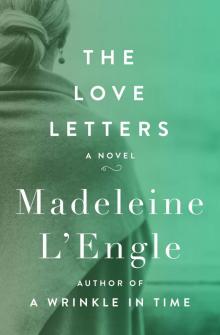 Love Letters
Love Letters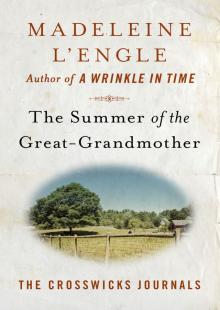 The Summer of the Great-Grandmother
The Summer of the Great-Grandmother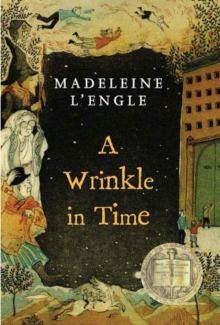 A Wrinkle in Time
A Wrinkle in Time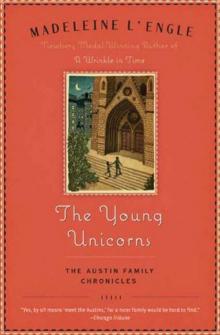 The Young Unicorns
The Young Unicorns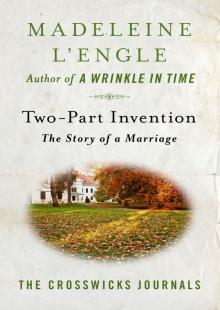 Two-Part Invention: The Story of a Marriage
Two-Part Invention: The Story of a Marriage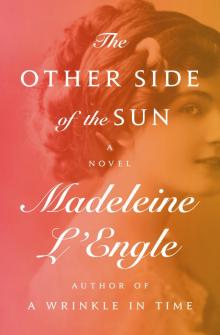 The Other Side of the Sun
The Other Side of the Sun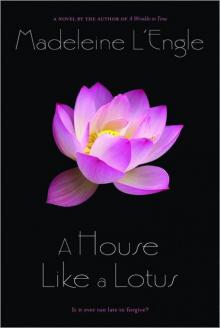 A House Like a Lotus
A House Like a Lotus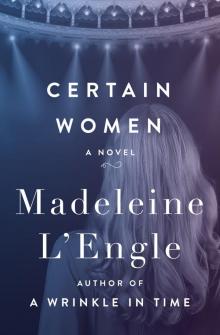 Certain Women
Certain Women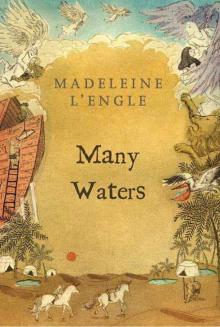 Many Waters
Many Waters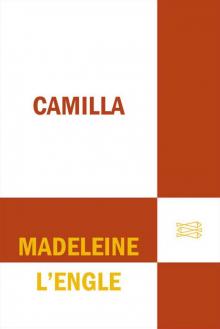 Camilla
Camilla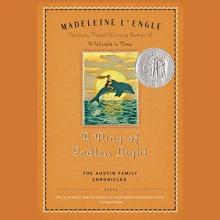 A Ring of Endless Light
A Ring of Endless Light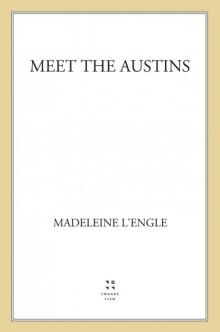 Meet the Austins
Meet the Austins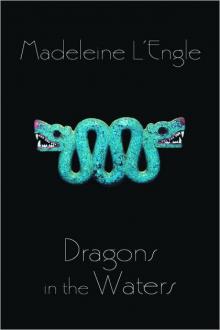 Dragons in the Waters
Dragons in the Waters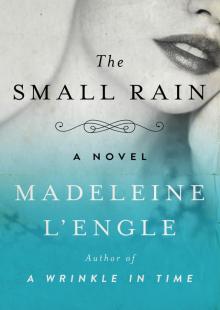 The Small Rain
The Small Rain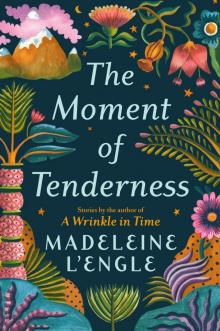 The Moment of Tenderness
The Moment of Tenderness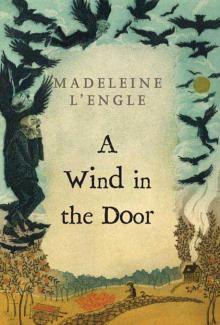 A Wind in the Door
A Wind in the Door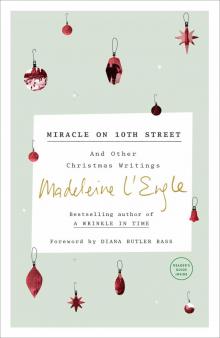 Miracle on 10th Street
Miracle on 10th Street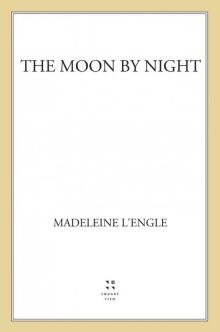 The Moon by Night
The Moon by Night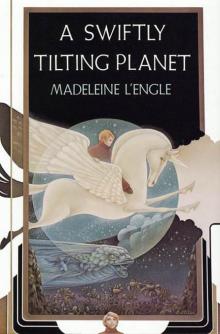 A Swiftly Tilting Planet
A Swiftly Tilting Planet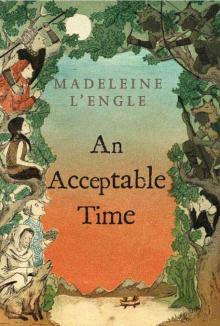 An Acceptable Time
An Acceptable Time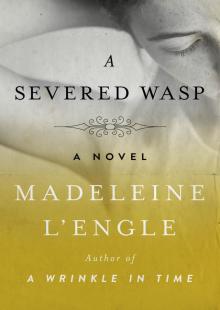 A Severed Wasp
A Severed Wasp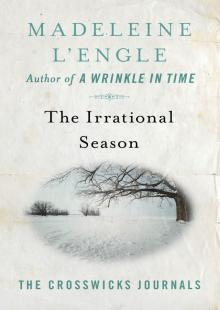 The Irrational Season
The Irrational Season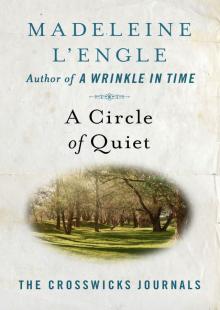 A Circle of Quiet
A Circle of Quiet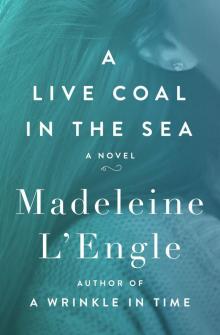 A Live Coal in the Sea
A Live Coal in the Sea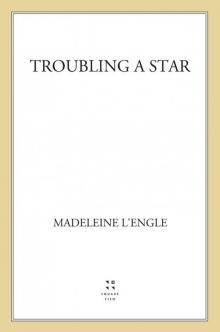 Troubling a Star
Troubling a Star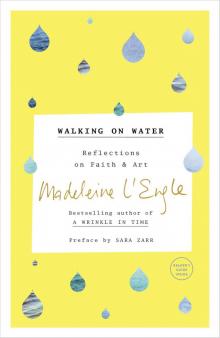 Walking on Water: Reflections on Faith and Art
Walking on Water: Reflections on Faith and Art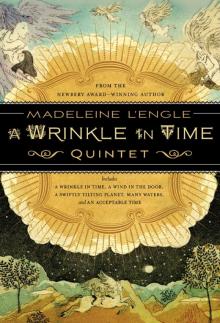 A Wrinkle in Time Quintet
A Wrinkle in Time Quintet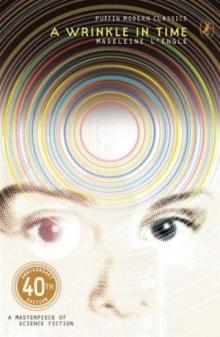 Wrinkle in Time
Wrinkle in Time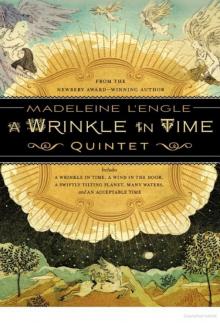 The Wrinkle in Time Quintet
The Wrinkle in Time Quintet Intergalactic P.S. 3
Intergalactic P.S. 3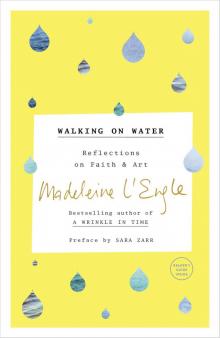 Walking on Water
Walking on Water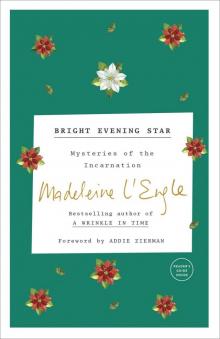 Bright Evening Star
Bright Evening Star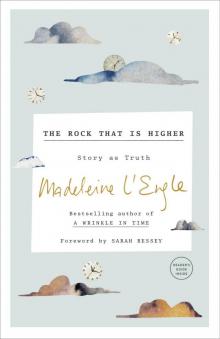 The Rock That Is Higher
The Rock That Is Higher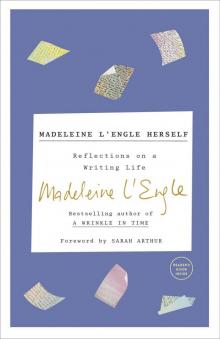 Madeleine L'Engle Herself
Madeleine L'Engle Herself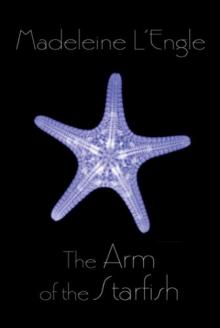 The Arm of the Starfish
The Arm of the Starfish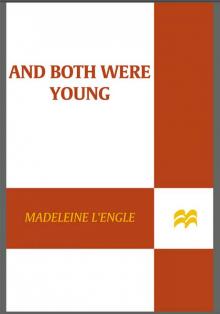 And Both Were Young
And Both Were Young The Twenty-four Days Before Christmas
The Twenty-four Days Before Christmas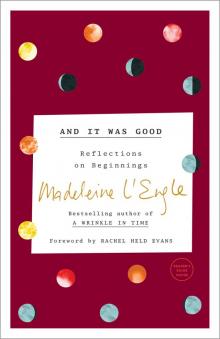 And It Was Good
And It Was Good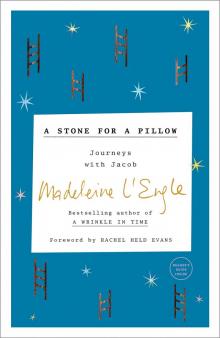 A Stone for a Pillow
A Stone for a Pillow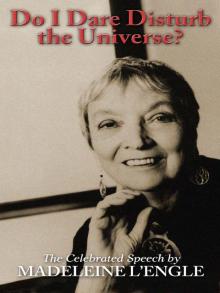 Do I Dare Disturb the Universe?
Do I Dare Disturb the Universe?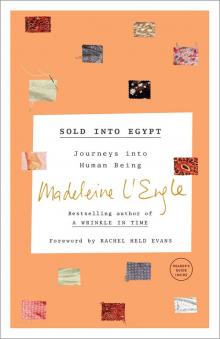 Sold into Egypt
Sold into Egypt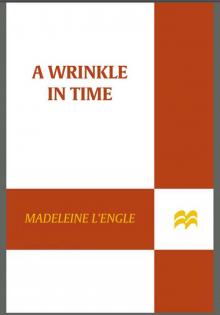 A Wrinkle in Time (Madeleine L'Engle's Time Quintet)
A Wrinkle in Time (Madeleine L'Engle's Time Quintet)